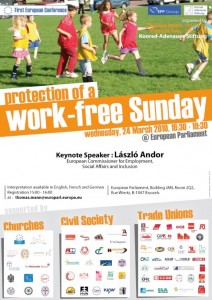Strict Standards: Non-static method Locate_Api_Map::getMetaKey() should not be called statically in /home/uxhbg5d8jpni/public_html/mgwministry/wp-content/themes/churchope/functions.php on line 194
 The Secretariat of COMECE, the Protestant Church in Germany (EKD) and the Church of England welcome the initiative of several Members of the European Parliament, to ask the House to decide on a Written Declaration “on the protection of a work-free Sunday as an essential pillar of the European Social Model and as part of the European cultural heritage”. Such a declaration would constitute an important commitment to a “Social Europe”. It is now important to find the majority necessary for this cross-party resolution, which has been launched by five parliamentarians – from the political groups of EPP, PSE, ALDE and UEN – on 2 February 2009.
The Secretariat of COMECE, the Protestant Church in Germany (EKD) and the Church of England welcome the initiative of several Members of the European Parliament, to ask the House to decide on a Written Declaration “on the protection of a work-free Sunday as an essential pillar of the European Social Model and as part of the European cultural heritage”. Such a declaration would constitute an important commitment to a “Social Europe”. It is now important to find the majority necessary for this cross-party resolution, which has been launched by five parliamentarians – from the political groups of EPP, PSE, ALDE and UEN – on 2 February 2009.
The economic and financial crises have made us more aware of the fact that not all aspects of life can be subject to market forces. Unrestrained consumption is neither a model for a sustainable economy, nor a healthy concept for human development. Men and women, who work on Sundays, are put at a disadvantage in their social relationships: Their family life, personal development and even health are verifiably affected.
A part of the European cultural heritage of longstanding tradition and high value, the work-free Sunday is a decisive factor in balancing work and family life. It is of fundamental importance for family relations, but also for social and cultural life to safeguard one of the few remaining times which can be shared by children and their parents. According to EU law, Sunday is the weekly rest day for children and adolescents (1). That is why respect for Sunday rest has the potential to be a pillar of the European social model.
In recent years, the protection of Sunday has been eroded in many Member States, with the purpose of increasing production and consumption. Workers have experienced fragmentation of their private lives, while small and medium-sized enterprises, which cannot afford uninterrupted opening hours have lost ground in the market place. Accordingly this declaration now introduced into parliament calls on the Member States and on the EU institutions to “protect Sunday, as a weekly rest day, in forthcoming national and EU working-time legislation in order to enhance the protection of workers’ health and the reconciliation of work and family life”.
In order to be adopted, it is now necessary for the Written Declaration to be signed by a majority (394) of MEPs before 7 May 2009.
——
(1)- See article 10 of Council Directive 94/33/EC of 22 June 1994, concerning the protection of young people at work, OJ L216, p. 12-20.
Article 116 of the Rules of Procedure of the European Parliament stipulates that a Written Declaration is a text of a maximum 200 words presented by a maximum of 5 MEPs and submitted to all MEPs for a period of 3 months. If the Declaration collects a majority of signatures, it becomes on official act of the European Parliament and is then transmitted to the addressees that are cited.
Text of the Written Declaration is in the annex and can also be found under:
http://www.europarl.europa.eu/activities/plenary/writtenDecl/wdFastOngoing.do
click here for source article

Leave a Reply